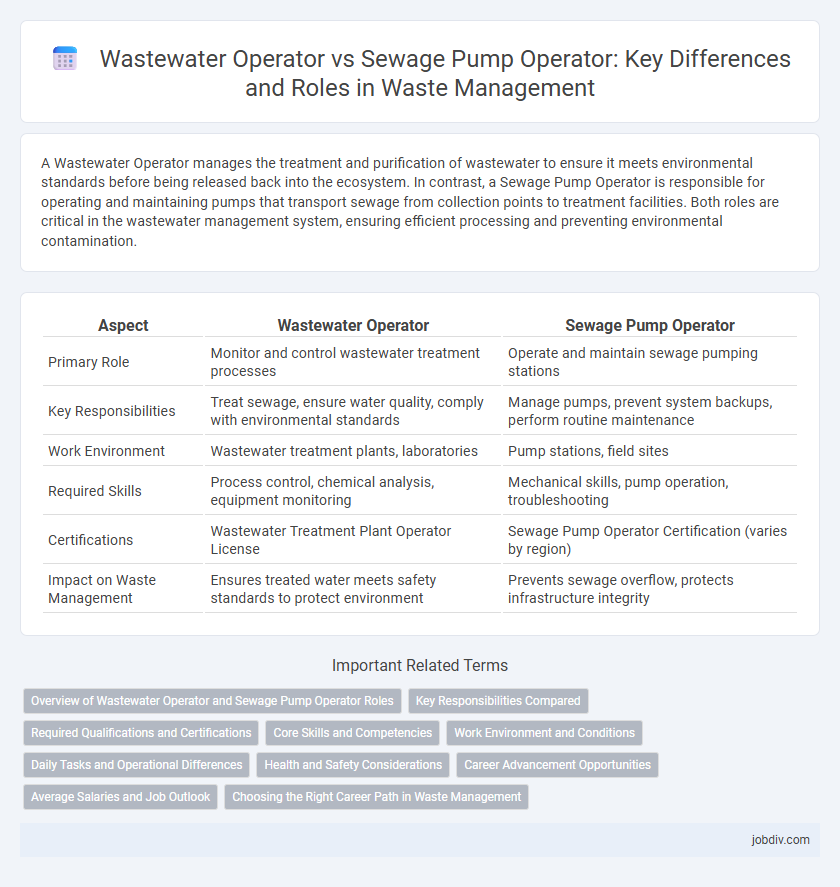A Wastewater Operator manages the treatment and purification of wastewater to ensure it meets environmental standards before being released back into the ecosystem. In contrast, a Sewage Pump Operator is responsible for operating and maintaining pumps that transport sewage from collection points to treatment facilities. Both roles are critical in the wastewater management system, ensuring efficient processing and preventing environmental contamination.
Table of Comparison
| Aspect | Wastewater Operator | Sewage Pump Operator |
|---|---|---|
| Primary Role | Monitor and control wastewater treatment processes | Operate and maintain sewage pumping stations |
| Key Responsibilities | Treat sewage, ensure water quality, comply with environmental standards | Manage pumps, prevent system backups, perform routine maintenance |
| Work Environment | Wastewater treatment plants, laboratories | Pump stations, field sites |
| Required Skills | Process control, chemical analysis, equipment monitoring | Mechanical skills, pump operation, troubleshooting |
| Certifications | Wastewater Treatment Plant Operator License | Sewage Pump Operator Certification (varies by region) |
| Impact on Waste Management | Ensures treated water meets safety standards to protect environment | Prevents sewage overflow, protects infrastructure integrity |
Overview of Wastewater Operator and Sewage Pump Operator Roles
Wastewater Operators manage the treatment process, monitoring chemical and biological systems to ensure safe water discharge, while Sewage Pump Operators are responsible for the operation and maintenance of pumps that move sewage through treatment facilities. Both roles require knowledge of pump mechanics and environmental safety standards but differ in task scope, with Wastewater Operators focusing on treatment and quality control, and Sewage Pump Operators concentrating on the mechanical operation of sewage conveyance. Proficiency in regulatory compliance and emergency response protocols is essential for effective performance in these water management positions.
Key Responsibilities Compared
Wastewater Operators manage treatment processes to ensure water quality meets environmental standards, including monitoring chemical levels and operating filtration systems. Sewage Pump Operators focus on maintaining and repairing pumping equipment to ensure continuous flow and prevent system backups. Both roles require knowledge of sanitation regulations but differ in hands-on maintenance versus treatment process management.
Required Qualifications and Certifications
Wastewater Operators typically require a state-issued Wastewater Treatment Plant Operator license, which involves passing certification exams based on the level of the facility, such as Class I through IV. Sewage Pump Operators must often hold a valid Commercial Driver's License (CDL) due to the operation of vacuum trucks and require specialized training in pump operation and maintenance. Both roles demand knowledge of environmental regulations, safety protocols, and hands-on experience with wastewater systems and equipment, but specific certifications depend on state and local requirements.
Core Skills and Competencies
Wastewater Operators specialize in monitoring and controlling treatment processes to ensure compliance with environmental regulations, utilizing skills in chemical analysis, equipment maintenance, and data interpretation. Sewage Pump Operators focus on the operation and maintenance of pumping stations, requiring expertise in mechanical troubleshooting, hydraulic systems, and emergency response protocols. Both roles demand strong problem-solving abilities, safety awareness, and knowledge of wastewater infrastructure to effectively manage waste transport and treatment.
Work Environment and Conditions
Wastewater Operators typically work in wastewater treatment plants, where they monitor systems, test water quality, and ensure regulatory compliance in controlled indoor environments with occasional exposure to noise and chemicals. Sewage Pump Operators often perform duties at pumping stations, maintaining and repairing pumps, frequently working outdoors or in confined spaces with exposure to harsh weather, odors, and potential hazards. Both roles demand adherence to safety protocols and can involve shift work, including nights, weekends, and holidays, to maintain continuous system operations.
Daily Tasks and Operational Differences
Wastewater Operators monitor and control treatment processes, analyzing water samples and adjusting chemical treatments to ensure regulatory compliance and safe water discharge. Sewage Pump Operators primarily manage the operation and maintenance of sewage pumping stations, including equipment monitoring, troubleshooting pump failures, and preventing blockages to maintain continuous flow. While both roles contribute to wastewater management, Wastewater Operators focus on treatment quality and regulatory standards, whereas Sewage Pump Operators concentrate on the mechanical and hydraulic aspects of sewage transport.
Health and Safety Considerations
Wastewater Operators ensure compliance with health regulations by monitoring treatment processes to prevent pathogen exposure and chemical hazards. Sewage Pump Operators manage pump systems to avoid mechanical failures and mitigate risks of toxic gas leaks, safeguarding workplace air quality. Both roles require strict adherence to personal protective equipment protocols and emergency response procedures to maintain operator safety.
Career Advancement Opportunities
Wastewater Operators manage the treatment process to ensure environmental compliance and water quality, often leading to senior technical roles or management positions within municipal or industrial facilities. Sewage Pump Operators specialize in maintaining and operating pumping stations critical for sewage flow, with career advancement typically involving supervisory roles or transition into broader wastewater system operation. Both careers offer growth through certifications, hands-on experience, and opportunities in environmental engineering and facility management sectors.
Average Salaries and Job Outlook
Wastewater operators earn an average salary of $55,000 per year, with job growth projected at 5% over the next decade due to increasing infrastructure needs. Sewage pump operators typically make around $48,000 annually, facing steady demand driven by urban population growth and aging sewer systems. Both roles require specialized training, but wastewater operators generally have higher earning potential and broader career advancement opportunities in the environmental services sector.
Choosing the Right Career Path in Waste Management
Wastewater Operators and Sewage Pump Operators both play critical roles in maintaining effective waste management systems, but their career paths differ in specialization and responsibilities. Wastewater Operators focus on treating and managing water quality in treatment plants, ensuring compliance with environmental regulations, whereas Sewage Pump Operators handle the operation and maintenance of pumping stations that transport sewage through the sewage system. Choosing the right career path depends on your interest in either water treatment processes or mechanical system operations within the broader field of wastewater management.
Wastewater Operator vs Sewage Pump Operator Infographic

 jobdiv.com
jobdiv.com